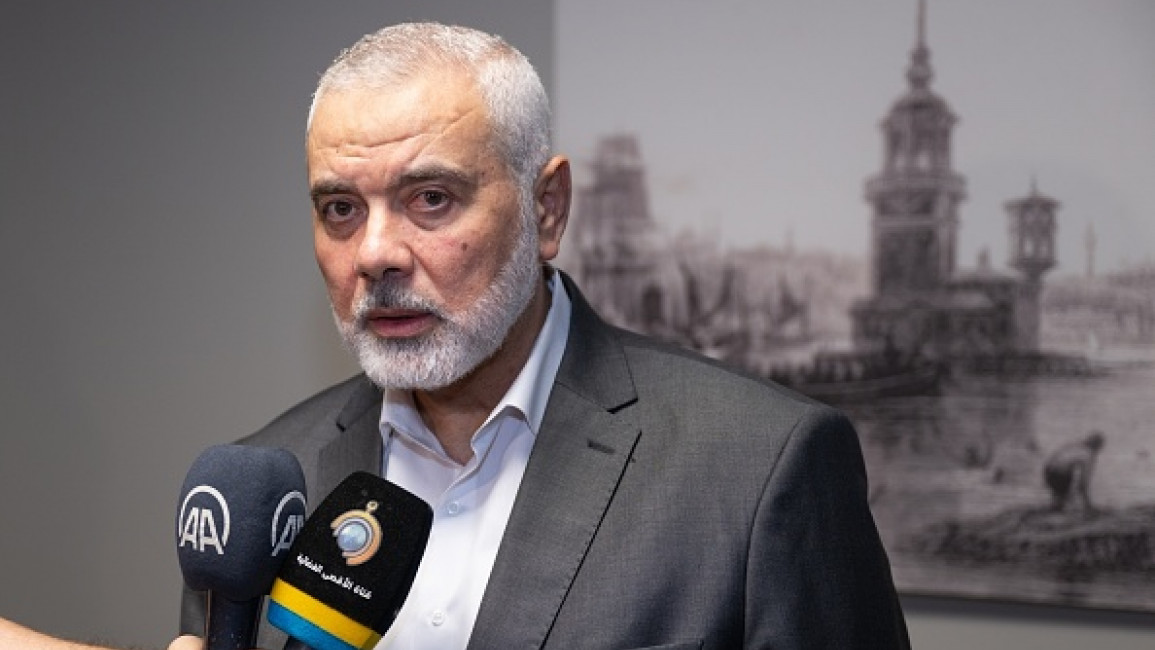What’s behind Ismail Haniyeh’s 'casual' response to news of sons' killings by Israel?
Questions have been raised about Ismail Haniyeh's apparent "lack of emotion" upon finding out that Israel killed his sons and grandchildren on Wednesday, forcing activists and commentators to clarify why his response is not unusual.
An Israeli airstrike on Gaza city killed three of his sons and at least four grandchildren, as they were driving in the Al-Shati area to visit family during the Eid Al-Fitr celebration.
A video showed the moment the Hamas political bureau chief was informed of the news while he was in Qatar, visiting wounded Palestinians who were taken to Doha for treatment.
His apparently "composed" reaction has triggered a wave of questions and accusations against the leader.
In the video, Haniyeh looks down and repeats: "May God have mercy on them", before continuing to visit the patients.
He later told Al Jazeera that he was grateful to God "for the honour he has given me in the deaths of three of my children and my grandchildren".
"My sons were awarded this honour, they remained with our Palestinian people in Gaza… the blood of my sons is not dearer than the blood of our people," he added.
While some have decried his reaction as "casual", "nonchalant", or even "psychotic", others have taken it as an opportunity to explain how being considered a martyr is a positive concept in Islamic tradition.
The moment Ismail Haniyeh received the news that his 3 sons were eliminated.
— Nioh Berg ♛ ✡︎ אסתר (@NiohBerg) April 10, 2024
Casual, nonchalant, uncaring, psychotic. pic.twitter.com/5SFlqNXn5R
"What's more peaceful than knowing your family and grandchildren are all martyrs and have the highest place in Jannah [heaven]?" one social media user responded.
"Because he knows they're martyrs, Jannah awaits them… death isn't the end for us and we will gladly die in the name of Allah," another social media user said.
According to the Islamic faith, certain groups of Muslims fall under the category of a shaheed ("martyr") including those who die of plague, fire, drowning, women who die in childbirth, those who die protecting their property, and those who die defending their family or religion.
Muslims believe that martyrs are given special privileges from God, including having their sins forgiven and being granted a place in paradise. Those who die a martyr are believed to have a "crown of dignity" on their head in the hereafter.
Others highlighted the concept of steadfastness and resilience, known as Sumud in Arabic.
The terms were first widely used in Palestine to describe acts following the 1967 war, known among Palestinians as the Naksa, which led to the annexation and occupation of the West Bank, East Jerusalem and Gaza.
Israel's military said it had "eliminated three Hamas military wing operatives" in central Gaza, adding that they were the sons of Haniyeh, but failed to mention the killing of his grandchildren.
Israel later added that the decision to kill the family was not cleared by the Israeli war cabinet or Prime Minister Benjamin Netanyahu.
Haniyeh said that the strike on his family would not put an end to truce talks or put pressure on Hamas to change its negotiating stance.
"The enemy will be delusional if it thinks that targeting my sons, at the climax of the negotiations and before the movement sends its response, will push Hamas to change its position,” he said.
Omar Shakir, the Israel and Palestine director at Human Rights Watch, highlighted that relatives of combatants not involved in fighting are considered civilians, dispelling Israeli claims that the children and grandchildren were "terrorists".
"Even political leaders, if not uninvolved in military ops, are not legitimate military targets under laws of war. Deliberate attacks on civilians are heinous war crimes that have no justification," he said in a post on X.
Over 33,000 Palestinians have been killed in Gaza since the start of the war on 7 October.
Israel’s bombardment campaign on the besieged enclave has plunged it into a deep humanitarian crisis, with several aid organisations warning that the enclave is on the brink of famine.
An additional 13,000 have been declared missing by the Euro-Med human rights monitor, while over 70,000 Palestinians are wounded, the Palestinian ministry of health said.



